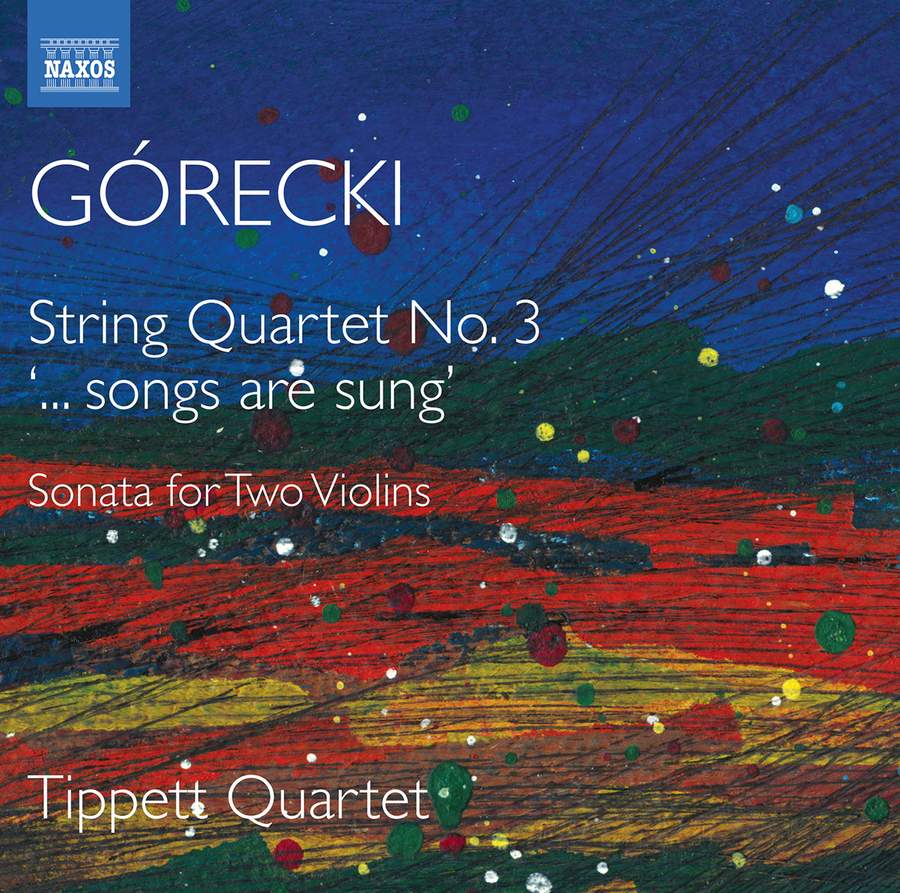GÓRECKI String Quartet No 3 (Tippet Quartet)
View record and artist detailsRecord and Artist Details
Genre:
Chamber
Label: Naxos
Magazine Review Date: 05/2020
Media Format: CD or Download
Media Runtime: 74
Mastering:
DDD
Catalogue Number: 8 574110

Tracks:
| Composition | Artist Credit |
|---|---|
| Sonata for 2 Violins |
Henryk Górecki, Composer
Jeremy Isaac, Violin John Mills, Violin |
| String Quartet No 3, '....songs are sung' |
Henryk Górecki, Composer
Tippett Quartet |
Author: Ivan Moody
Górecki’s series of string quartets, written over a relatively short span of time (the first dates from 1988) are absolutely fundamental to understanding his work. They are concentrated, visceral, profound considerations of the beautiful and the violent. And if that sounds like a description of his output in general, it applies doubly to these works, unique as they are in contemporary music. Recording them is, accordingly, not something to be undertaken lightly, and the Tippett Quartet’s traversal –this is the second of two discs – give us what is, I believe, the most eloquent version yet.
Indeed, anyone who was as staggered by the Tippett Quartet’s first volume of Górecki as I was (1/19) will have been waiting with baited breath for this. It is every bit as good as the first disc, with the added surprise of the Sonata for two violins, an early work, dating from 1957. I’d never really given it much consideration before, but this recording has made me see it in a completely different light and, in spite of the clear influence of Bartók, as being intimately connected with Górecki’s language in the three string quartets. They are all there in embryo, so to speak – the astounding outbursts of manic violence, the sonic collisions, the extraordinary sense of calm. This is a major work, coming in at just under 18 minutes, and it is played with consummate mastery by the two violinists of the Tippett Quartet, John Mills and Jeremy Isaac.
As for the String Quartet No 3, I would say that the Tippett Quartet’s recording outdoes both that by the Kronos, for whom the work was written, and that by the Royal, fine achievements though both are, in its understanding of the music’s pacing – just under 57 minutes in this recording, with only one of the five movements being fast. This is one minute faster than the Royal but considerably slower than the Kronos, who come in at around 50 minutes. The question of pacing is, indeed, of the first importance in this work, because of the predominantly slow tempos – though there are moments of storming the heavens, the predominant tone throughout is unmistakably one of lamentation and loss, eerily appropriate for the uncertainty the world is currently experiencing. But the work is neither sentimental nor nihilistic; rather, it feels like what it is, a late work by a composer never willing to compromise and always desirous of being absolutely certain of what he was saying. Indeed, Górecki waited for 10 years before releasing the work for performance, having essentially completed it in 1995.
The music in the Tippett Quartet’s hands really sings, as its title (inspired by a poem by Khlebnikov) indicates that it should, but there is also a breathtaking sense of control: the very first chords give one, in fact, the sensation of having accidentally dropped in on a performance that has been in progress for a very long time, so much does it transmit a sense of monumentality that functions outside normal temporal constraints. Again, this is essential in Górecki, because of the way he alternates material of totally transparent simplicity and moments of what sounds like barely suppressed fury: the music would fall apart without a genuine understanding of the way it is held together, or its underlying narrative, no matter how fragmented it may initially appear. This is as true of the narrative of the work as a whole as it is of the individual movements, and over such a long time span it is no small achievement that the end of the final movement feels genuinely like an apotheosis that has been reached over a journey that began with (or whose beginning we now perceive to have been) those very first chords of the opening movement. There is also a depth to the Tippett Quartet’s sound that allows them to be utterly convincing in both the uncertain alternations of mood in the third movement and such exposed moments as the beginning of the fourth.
The recorded sound is superb, by far the best of the three recordings, neither too resonant nor too dry, allowing the Tippetts every opportunity for the full variety of their sound to shine – and shine is exactly the word for playing of this quality. The disc comes accompanied by highly informative booklet notes by Richard Whitehouse. I cannot recommend this recording highly enough, and have run out of superlatives
Discover the world's largest classical music catalogue with Presto Music.

Gramophone Digital Club
- Digital Edition
- Digital Archive
- Reviews Database
- Full website access
From £8.75 / month
Subscribe
Gramophone Full Club
- Print Edition
- Digital Edition
- Digital Archive
- Reviews Database
- Full website access
From £11.00 / month
Subscribe
If you are a library, university or other organisation that would be interested in an institutional subscription to Gramophone please click here for further information.




